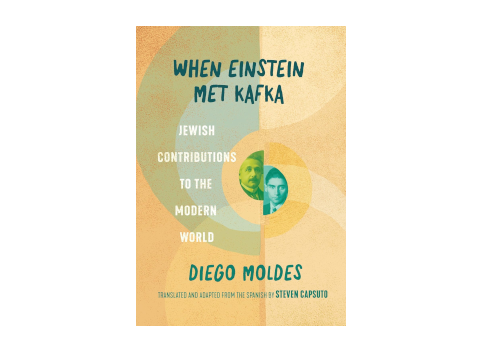
02. “When Einstein Met Kafka,” a book by Diego Moldes
When Einstein Met Kafka: Jewish Contributions to the Modern World. Mandel Vilar Press, 2025. 620 pp. Translated and adapted from Spanish to English by Steven Capsuto.
“This landmark contribution by a leading cultural historian, Diego Moldes, is an original achievement: the fullest and most historically grounded study of Jewish intellectual and cultural achievements and contributions.” —Harvey Graff, Professor Emeritus of English and History, Ohio State University, author of The Literacy Myth and Searching for Literacy: The Social and Intellectual Origins of Literary Studies
“There is no book like this one, which examines the contributions of Jews as individuals (not as a religious people) to all fields of knowledge.” —Stuart Weitzman, world renowned shoe designer and entrepreneur
In April 1911, Prague artists, writers, and intellectuals gathered regularly at the Café Louvre, an intellectual center where music was played and high-level discussions were held. Many of the attendees were German-speaking Jews, such as Franz Kafka and his faithful friend Max Brod, Hugo Bergmann, Oskar Kraus, Franz Werfel, the mathematician Georg Pick, and a new arrival to the city, thirty-two-year-old Albert Einstein. Is it possible that Kafka and Einstein met and exchanged ideas? Did they influence each other from a philosophical or deep-thinking perspective?
Neither Kafka’s nor Einstein’s correspondence makes even the slightest mention of each other. But Einstein and Kafka, two icons of our modern era, serve as the starting point for this book on the enormous contributions in the fields of the empirical sciences, humanities, letters, and arts by individuals of Jewish origin in modernity. In this book, the reader will encounter numerous names in the pages that all spring from the fountainhead of these two antecedents, the Einsteinian and the Kafkian.
While Jews account for 0.2 percent of the world’s population and no more than 2.5 percent of any country except Israel, they have made some of the greatest contributions to Western Culture in diverse fields that range from physics and philosophy to music and art. One register of these contributions is Nobel Prizes: from its first recipients in 1917, 26 percent of awardees in the Nobel’s six fields — among them, physics, physiology/medicine, and economics — have been Jews. What accounts for the extraordinary breadth of these achievements? This is a question that Diego Moldes examines in When Einstein Met Kafka.
His answers include the history of Jewish culture itself, from Orthodox to secular, with its emphasis on literacy, learning, and especially inquiry and questioning. Until the European Enlightenment in the 18th century, Jews did not have full citizenship and civil rights — they were barred from universities, from government, and from entire professions. The Enlightenment opened the doors!
Despite the outbreaks of violent anti-Semitism—or what Diego Moldes calls Judeophobia—and continuing discrimination in all western countries, Jews now had legal rights, and they persevered. In a near-encyclopedic fashion, he profiles just how thousands of individual Jews, by name, made original contributions to fields as diverse as medicine, artificial intelligence, philosophy, history, economics, business, world finance, computing, sports, film, architecture, and more! The book itself is an extraordinary achievement, the result of twenty years of intensive research, yet written in an immensely engaging style.
ABOUT THE AUTHOR:
Diego Moldes, a Spanish essayist, novelist, poet, critic, and historian of cinema and culture—author of more than a dozen published books—holds a PhD in Information Sciences from Complutense University in Madrid, a BA in Advertising and Public Relations, and two MAs: one in Publishing and one in Foundation Management. In 2019, Galaxia Gutenberg published the original Spanish edition of When Einstein Met Kafka. His connection to Judaism led him to contribute articles to Raíces: Revista judía de cultura (Roots: A Jewish cultural magazine). From 2015 to 2018, he served as director-general (CEO) of Fundación Hispanojudía (the Hispanic-Jewish Foundation of Spain). In 2015, he became president and cofounder of ONG Asociación Fania (the Fania Association), a group that combats antisemitism and supports Jewish cultural endeavors.
